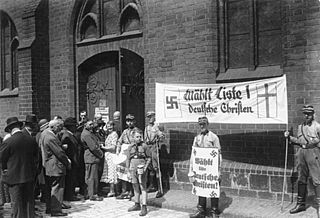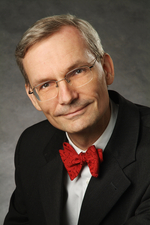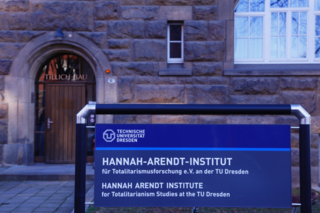Related Research Articles

Denazification was an Allied initiative to rid German and Austrian society, culture, press, economy, judiciary, and politics of the Nazi ideology following the Second World War. It was carried out by removing those who had been Nazi Party or SS members from positions of power and influence, by disbanding or rendering impotent the organizations associated with Nazism, and by trying prominent Nazis for war crimes in the Nuremberg trials of 1946. The program of denazification was launched after the end of the war and was solidified by the Potsdam Agreement in August 1945. The term denazification was first coined as a legal term in 1943 by the U.S. Pentagon, intended to be applied in a narrow sense with reference to the post-war German legal system. However, it later took on a broader meaning.

The German Evangelical Church was a successor to the German Evangelical Church Confederation from 1933 until 1945.

Michael F. Feldkamp is a German historian and journalist.
Church musician (Kirchenmusiker) is a music profession in Germany.
Leonore Siegele-Wenschkewitz was a German church historian and director of the Evangelische Akademie Arnoldshain. She was co-editor of the journal Kirche und Israel and of the issue Arbeiten zur kirchlichen Zeitgeschichte. She was known for her work on anti-Jewish tendencies in Christian theology.
Eckhard Jesse is a German political scientist. He held the chair for "political systems and political institutions" at the Technical University of Chemnitz from 1993 to 2014. Jesse is one of the best known German political scholars in the field of extremism and terrorism studies. He has also specialized in the study of German political parties and the German political system.

Gerhard Besier is a German Lutheran theologian, historian and politician best known for his work on church-state relations in the Third Reich and in the German Democratic Republic.

Horst Möller is a German contemporary historian. He is Professor of Modern History at the Ludwig Maximilian University of Munich (LMU) and, from 1992 to 2011, Director of the Institut für Zeitgeschichte.
Paul Althaus was a German Lutheran theologian. He was born in Obershagen in the Province of Hanover, and he died in Erlangen. He held various pastorates from 1914 to 1925, when he was appointed associate professor of practical and systematic theology at the University of Göttingen, becoming full professor two years later. Althaus was moderately critical of Lutheran Orthodoxy and evangelical-leaning Neo-Lutheranism. He termed it a “mistake” to “defend the authenticity and infallibility of the Bible.”

The Hannah Arendt Institute for Totalitarianism Studies is a research institute hosted by Dresden University of Technology and devoted to the comparative analysis of dictatorships. The institute focusses particularly on the structures of Nazism and Communism as well as on the presuppositions and consequences of the two ideological dictatorships. The institute is named after the German-American philosopher and political scientist Hannah Arendt, whose magnum opus The Origins of Totalitarianism (1951) is considered across disciplines as one of the most influential works of the 20th century and continues to shape in particular scholarly discussions of totalitarian systems of political domination.
Bernhard Schweitzer was a German classical archeologist.
Ludwig Geißel was a German charity administrator who became vice-president of Diakonisches Werk, a charitable organization of the Protestant / Evangelical churches in Germany). He was a co-founder of the Bread for the world programme.

The Evangelische Arbeitsgemeinschaft für Kirchliche Zeitgeschichte (EvAKiZ) is concerned with the scientific examination of issues and methods of contemporary church history. Most recent church history is evaluated by the EvAKiZ in scientific autonomy. Its members are representatives of theology, historical science, sociology and history of art. In its editorial series the EvAKiZ publishes contemporary historical sources and scientific surveys of the history of 20th century Protestantism.

For the composer, see Christian Hartmann (composer).
Friedrich Karrenberg was a German Evangelical-reformed social ethicist and professor. He was a leading member of the Evangelical Church in the Rhineland.
Michael Buddrus is a German historian.

Otto Friedrich Wilhelm Stapel, was a German Protestant and nationalist essayist. He was the editor of the influential antisemitic monthly magazine Deutsches Volkstum from 1919 until its shutdown by the Nazis in 1938.
Fritz Reuter was a German musicologist, music educator, composer and Kapellmeister. Reuter was one of the most important German music educators of the 20th century. After studying music and musicology in Dresden and Leipzig, with Teichmüller, Riemann, Schering and Abert, he received his doctorate in 1922. In 1945, he was appointed Kapellmeister at the Volksoper in Dresden. In 1949, he was appointed as the first professor of music education at a German university. He was also director of institutes at the Martin Luther University of Halle-Wittenberg and the Humboldt University Berlin. In 1955, he was one of the initiators of the first Hallische Musiktage.
Elisabeth Moltmann-Wendel was a German feminist theologian, best remembered as the founder of the European Society of Women in Theological Research (ESWTR) in 1986. Her publications translated into English include Liberty, Equality, Sisterhood: The Women around Jesus, A Land Flowing with Milk and Honey, I Am My Body, and Rediscovering Friendship.

Dieter Pohl is a German historian and author who specialises in the Eastern European history and the history of mass violence in the 20th century.
References
- 1 2 3 "Dr. Clemens Vollnhals M.A. | Hannah-Arendt-Institut". hait.tu-dresden.de. Retrieved 2019-07-29.